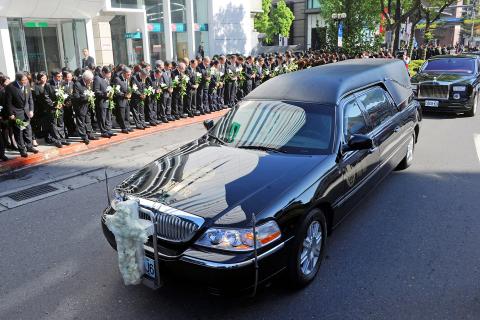The body of Jeffrey Koo Sr (辜濂松), founder and former chairman of one of Taiwan’s largest banks, Chinatrust Financial Holding Co, arrived in Taiwan early yesterday morning.
Koo died at the age of 79 on Dec. 5 in New York after reportedly battling Parkinson’s disease for some years.
The charter plane carrying Koo’s body along with members of his family was greeted by dozens of Chinatrust executives and other Koo family members.

Photo: CNA
The Koo family organized a simple ceremony led by a pastor for the late banker at an EVA Airways cargo facility before taking his body in a motorcade to Taipei.
The motorcade drove past Chinatrust’s headquarters in Taipei’s Xinyi District (信義), where more than 2,000 employees lined up on the street to mourn Koo’s death, many of them in tears.
The motorcade then drove to Sanjhih (三芝) in New Taipei City (新北市), where Koo’s body was to be temporarily placed.
Later, more than 300 Chinatrust employees were taken to Sanjhih to pay their respects to Koo.
According to Chinatrust, his family will organize a requiem Mass.
Koo went to the US earlier this year for treatment, where he was reported to have been diagnosed with a brain tumor.
He died in the company of his family.
His elder son, Jeffrey Koo Jr (辜仲諒), who had been previously barred from leaving the country over his alleged role in a financial scandal, paid a record NT$1billion (US$34.3 million) as a guarantee late last month in exchange for court permission to visit his ailing father in New York.
The late tycoon represented Taiwan in the international arena in numerous capacities, including serving as the nation’s representative on the APEC’s Business Advisory Council from 1995 to 2009.
A long-time “ambassador-at-large,” in September Koo was conferred the Order of the Rising Sun by the Japanese government, the highest honor given by Japan to businesspeople, for his contributions in promoting Japan-Taiwan ties.
He has also been honored by former president Chen Shui-bian (陳水扁) and President Ma Ying-jeou (馬英九) for his long-term efforts in expanding Taiwan’s ties with the international community, and pushing for economic and trade cooperation with other countries.

A preclearance service to facilitate entry for people traveling to select airports in Japan would be available from Thursday next week to Feb. 25 at Taiwan Taoyuan International Airport, Taoyuan International Airport Corp (TIAC) said on Tuesday. The service was first made available to Taiwanese travelers throughout the winter vacation of 2024 and during the Lunar New Year holiday. In addition to flights to the Japanese cities of Hakodate, Asahikawa, Akita, Sendai, Niigata, Okayama, Takamatsu, Kumamoto and Kagoshima, the service would be available to travelers to Kobe and Oita. The service can be accessed by passengers of 15 flight routes operated by

GIVE AND TAKE: Blood demand continues to rise each year, while fewer young donors are available due to the nation’s falling birthrate, a doctor said Blood donors can redeem points earned from donations to obtain limited edition Formosan black bear travel mugs, the Kaohsiung Blood Center said yesterday, as it announced a goal of stocking 20,000 units of blood prior to the Lunar New Year. The last month of the lunar year is National Blood Donation Month, when local centers seek to stockpile blood for use during the Lunar New Year holiday. The blood demand in southern Taiwan — including Tainan and Kaohsiung, as well as Chiayi, Pingtung, Penghu and Taitung counties — is about 2,000 units per day, the center said. The donation campaign aims to boost

ENHANCING EFFICIENCY: The apron can accommodate 16 airplanes overnight at Taoyuan airport while work on the third runway continues, the transport minister said A new temporary overnight parking apron at Taiwan Taoyuan International Airport is to start operating on Friday next week to boost operational efficiency while the third runway is being constructed, the Ministry of Transportation and Communications said yesterday. The apron — one of the crucial projects in the construction of the third runway — can accommodate 16 aircraft overnight at the nation’s largest international airport, Minister of Transportation and Communications Chen Shih-kai (陳世凱) told reporters while inspecting the new facility yesterday morning. Aside from providing the airport operator with greater flexibility in aircraft parking during the third runway construction,

American climber Alex Honnold is to attempt a free climb of Taipei 101 today at 9am, with traffic closures around the skyscraper. To accommodate the climb attempt and filming, the Taipei Department of Transportation said traffic controls would be enforced around the Taipei 101 area. If weather conditions delay the climb, the restrictions would be pushed back to tomorrow. Traffic controls would be in place today from 7am to 11am around the Taipei 101 area, the department said. Songzhi Road would be fully closed in both directions between Songlian Road and Xinyi Road Sec 5, it said, adding that bidirectional traffic controls would